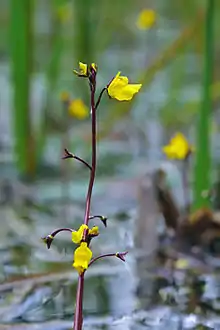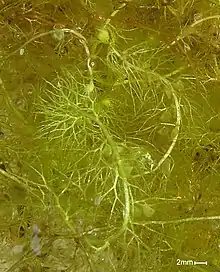Utricularia vulgaris
Utricularia vulgaris (greater bladderwort[1] or common bladderwort) is an aquatic species of bladderwort found in Asia and Europe. The plant is a free-floating and does not put down roots. Stems can attain lengths of over one metre in a single growing season, but die back and form turions in winter. The leaves are finely pinnately divided, between one and eight centimetres long and carry many bladder-like traps. The yellow flowers are borne on stalks above the surface of the water between April and August. In eastern Asia and North America, its place is taken by the related species U. macrorhiza.

Inflorescence of Utricularia vulgaris
| Common bladderwort | |
|---|---|
 | |
| Utricularia vulgaris, the common bladderwort | |
| Scientific classification | |
| Kingdom: | Plantae |
| Clade: | Tracheophytes |
| Clade: | Angiosperms |
| Clade: | Eudicots |
| Clade: | Asterids |
| Order: | Lamiales |
| Family: | Lentibulariaceae |
| Genus: | Utricularia |
| Subgenus: | Utricularia subg. Utricularia |
| Section: | Utricularia sect. Utricularia |
| Species: | U. vulgaris |
| Binomial name | |
| Utricularia vulgaris | |
References
- "BSBI List 2007". Botanical Society of Britain and Ireland. Archived from the original (xls) on 2014-10-23. Retrieved 2014-10-17.
| Wikimedia Commons has media related to Utricularia vulgaris. |
This article is issued from Wikipedia. The text is licensed under Creative Commons - Attribution - Sharealike. Additional terms may apply for the media files.
